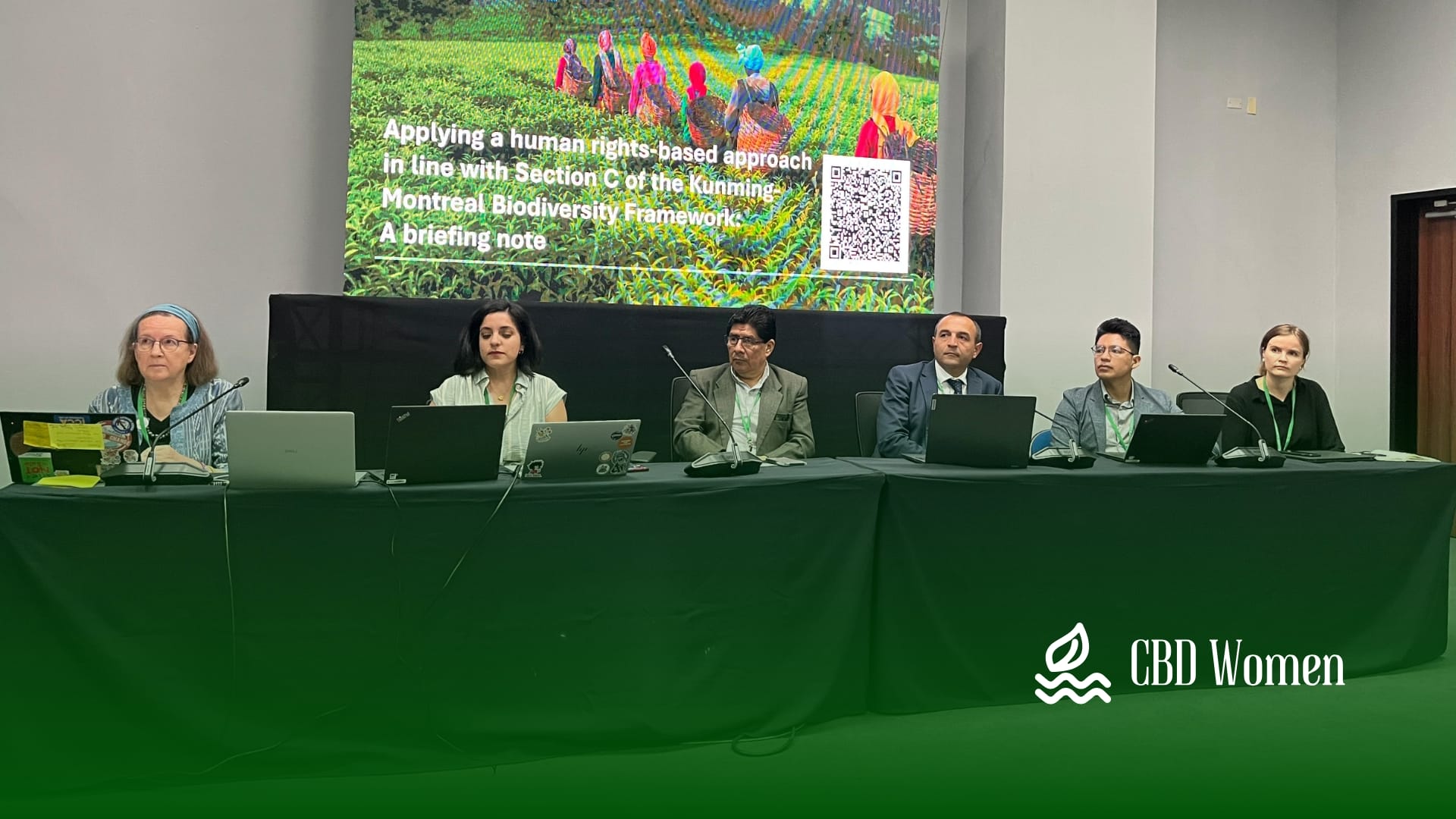On the 20th of October,2025, the Secretariat of the Convention on Biological Diversity (SCBD) and the Office of the United Nations High Commissioner for Human Rights (OHCHR) co-hosted a side event marking the launch of a new Briefing Note on “Applying a Human Rights-Based Approach (HRBA) in line with Section C of the Kunming–Montreal Global Biodiversity Framework (KMGBF).”
This milestone event convened representatives from governments, Indigenous Peoples and Local Communities (IPlcs), youth, and civil society, including the CBD Women’s Caucus, to explore how human rights are interwoven with biodiversity and why integrating HRBA into biodiversity action is critical to achieving the KMGBF’s goals.
A Rights-Based Path for Biodiversity
Opening the session,Mr Q”apaj Conde Choque from the CBD Secretariat underscored that “our collective success depends on safeguarding those who depend on biodiversity.” Healthy ecosystems sustain fundamental human rights including the right to a clean, healthy, and sustainable environment. Section C of the KMGBF calls for embedding a HRBA across all programmes of work, not just within Article 8(j), ensuring that biodiversity action strengthens equity, participation, and justice.
Ms. Nela Cernota, from the Office of the High Commissioner for Human Rights (OHCHR) elaborated on how Human Rights Council Resolution 57/28 and the International Court of Justice’s advisory opinion underscore the need to integrate human rights into the implementation of environmental agreements. The Briefing Note serves as a practical guide, outlining why human rights matter for biodiversity, identifying duty bearers, and offering tools to integrate HRBA at all stages of National Biodiversity Strategies and Action Plans (NBSAPs).
From Words to Action: Voices from the Panel
Bridging Policy and Practice
The CBD Women’s Caucus, represented by Ms.Amelia Arreguín Prado, shared key findings from its assessment of gender responsiveness in NBSAPs. Examples from Togo, Uganda, Jordan, and Moldova illustrated that while the KMGBF’s Targets 22 and 23 set strong gender and justice ambitions, implementation remains uneven. The CBD WC highlighted that women and girls , in all their diversity, are not merely stakeholders but are knowledge holders, rights defenders, and agents of change who must be at the centre of biodiversity governance.
Ms. Cristina Egenter from the Human Rights & Biodiversity Working Group shared early results from a Human Rights-Based Approach (HRBA) assessment of 31 NBSAPs and 24 national targets. Positive trends include stronger integration of gender equality, inclusive participation mechanisms, and recognition of traditional knowledge—though references to Free, Prior and Informed Consent (FPIC) remain inconsistent.
She also noted ongoing gaps in addressing newer KMGBF elements, such as environmental human rights defenders, persons with disabilities, access to justice, and land rights for Indigenous Peoples and women. Actions must rise to meet the ambition of the targets, she concluded.
Mr. Davit Knyazyan from the Government of Armenia offered a local example of policy transformation through a HRBA. When overfishing in Lake Sevan threatened both livelihoods and ecosystems, the government introduced a community-based, rights-informed policy that restored ecological balance while sustaining local economies. His message: human rights and conservation are not contradictory, they are complementary.
Ms. Josefa Cariño Tauli from the Global Youth Biodiversity Network (GYBN) emphasized the importance of intergenerational equity. Youth, he said, are already monitoring biodiversity impacts and developing youth-responsive indicators under the KMGBF monitoring framework. “We must go beyond precaution to intergenerational action,” he urged.
Finally, Ms. Warthane Puvanarajah Germany reaffirmed its commitment to supporting HRBA in biodiversity through its international cooperation initiatives highlighting safeguards under the International Climate Initiative (IKI) and the recognition of Indigenous and Community Conserved Areas (ICCAs) as essential to achieving the 30×30 target.
Throughout the discussion, Sweden, Colombia, and other Parties reiterated the need for concrete guidance to help countries operationalize Section C of the KMGBF. Sweden noted the importance of “target-wise guidance and collaborative analysis to identify gaps, case studies, and actionable steps,” while Colombia shared its experience in recognizing the rights of nature as part of national reconciliation efforts, linking environmental protection with peacebuilding and social justice.
The event concluded with a shared call to action:
- Apply HRBA across all programmes of work, not as an add-on.
- Strengthen accountability and monitoring mechanisms for Section C implementation.
- Ensure meaningful participation of women, youth, and IPlcs in decision-making.
- Provide resources and capacity support for rights-based NBSAP implementation.




